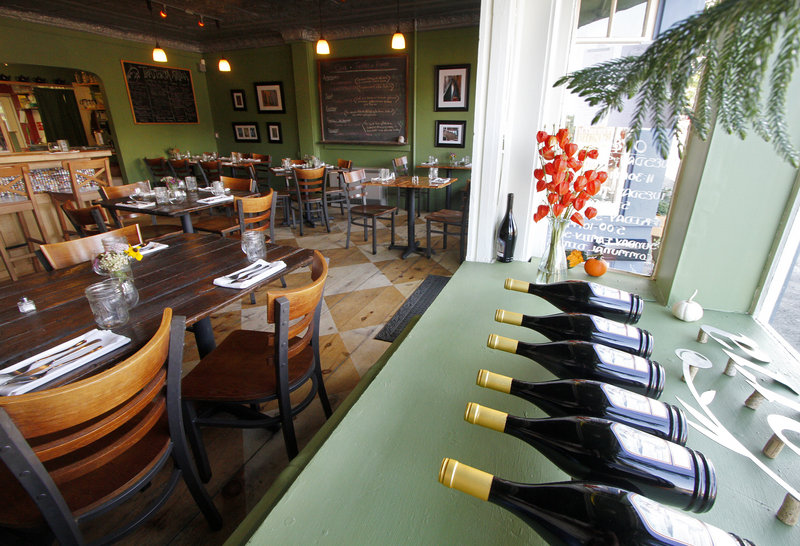BRUNSWICK – Greek and Italian cuisine celebrate their differences at Trattoria Athena, where the wise-in-counsel namesake would be pleased to see her gift of olives appreciated in an olive oil “service” ($2.50).
It’s also clear someone wise in counsel came up with a thoroughly intriguing menu, highlighted by enough unusual dishes to sharpen any food lover’s appetite. My omnivorous companion’s eyes lighted up when she saw braised goat chops on the list of entrees, and my own were attracted to the house pasta with wild boar ragu. Both selections proved excellent.
Portland’s Emilitsa and Ellsworth’s Cleonice have discovered that locals are excited by the strong, clear flavors of Greek dishes, and Italian food has been popular on the coast for decades — although only recently, as far as I can discover, has it been served with as pure an interpretation as we can take for granted now. At Trattoria Athena, freshly made, tender pasta, hard salami and prosciutto di Parma reveal essential Italian flavors in every bite.
Tim O’Brien, one of the restaurant’s two owners, is Italian and also owns Ancora Pasta, which sells fresh pasta at the Bath Farmers Market. Co-owner Marc Provencher is Greek, and he is the source of the goat chop recipe as well as the ice cream. Both clearly know how to cook.
The restaurant has a small, rustic dining room with a rusted silhouette of sheet metal shaped into Italy and Greece, Sicily and Crete on one wall. Our dinner started with dishes that bridged the Ionian Sea.
Juniper berries plant a piney note of aroma in the pappardelle al sugo di cinghiale ($18 as an entree, or $9 as an appetizer, as we requested). The meat held its funkier scent in balance with the juniper and the fruity, late-summer tomatoes, along with freshly grated Parmesan on zigzag-edged, wide and flat noodles.
An appetizer special — kolokythopia, a fennel, feta and squash pie in a crust of phyllo dough ($9) — was easy to enjoy. The salty feta and mild squash were both friendly, familiar tastes and delicious.
Greek and Italian wines are listed separately. Mercouri Foloi 2009 ($7 a glass, $26 a bottle), a white from the Peloponnese, held its own with the boar pasta.
Boutari Naoussa ($9 a glass, $32 a bottle) is a Greek red with power and presence. From the Italian list, its equal in sturdy texture is the Nifo Sarrapochiello Aglianico 2006 ($9 a glass, $32 a bottle) from Campania.
Though we didn’t taste them, the menu’s salads are alluring, especially the eggplant and tomato take on caprese ($8 or $5.50 for full or half portions) or horiatiki ($8.50 or $6) with tomato, cucumber, red onion, olives, Dodonis feta, Greek oregano and apple cider vinegar.
Local goat chops ($19), with a buried trove of sauteed arugula and Greek yogurt that chimed in with cooling, vegetal qualities, taught the basics of goat meat’s appeal.
It holds its own savory power, something darker or more vivid than ordinary beef and equally tasty. Braised, as it was in this dish, the meat is tender and succulent.
The fish of the night was our one disappointment — halibut that was mushy and overcooked. The fillet was very thin. Perhaps this was the only way the entree could come in under $20, like most entrees, but that can present a challenge to cook properly.
Its accompaniment was charming, especially the argolemono (extremely lemony mayonnaise made with good olive oil). Trahana, a version of couscous with sauteed leeks and cherry tomatoes, was also delicious.
Braised lamb shanks, moussaka, risotto and a daily ravioli are more possibilities among the entrees, and the list of specials on a chalkboard cover every category. Braised rabbit in tomato or ravioli with potato and leeks were on the board the night of our visit.
I steered my friend away from the Greek yogurt, nuts and honey dessert on the list to something stranger and more challenging to the kitchen — including the excellent walnut cake saturated with orange ($7).
Two scoops of house ice cream ($5) kept us guessing — and wrong. The rosemary and honey ice cream seemed to have been made with goat milk, but though we couldn’t get that impression out of our mind as we tasted it, the kitchen assured our server it was made with cow’s milk.
Likewise the mastika, flavored with pine resin like the Greek wine retsina, kept our spoons busy, but it didn’t win us over. Still, we tasted both till they were nearly gone, as we were too curious to stop.
Greek coffee ($4) flavored with cardamom was sweet and strong, and decaf in a French press pot ($3) was as good as it could be — a fine way to complete such a satisfying meal.
N.L. English is a Portland freelance writer and the author of “Chow Maine: The Best Restaurants, Cafes, Lobster Shacks and Markets on the Coast.” Visit English’s Web site, www.chowmaineguide.com.
Send questions/comments to the editors.


